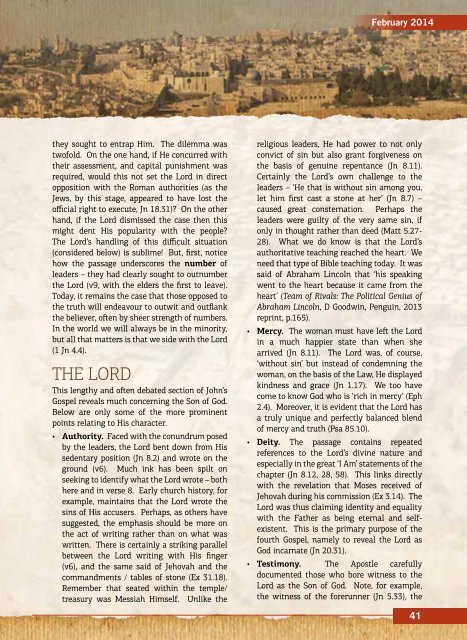Create successful ePaper yourself
Turn your PDF publications into a flip-book with our unique Google optimized e-Paper software.
<strong>February</strong> 2014<br />
they sought to entrap Him. The dilemma was<br />
twofold. On the one hand, if He concurred with<br />
their assessment, and capital punishment was<br />
required, would this not set the Lord in direct<br />
opposition with the Roman authorities (as the<br />
Jews, by this stage, appeared to have lost the<br />
official right to execute, Jn 18.31)? On the other<br />
hand, if the Lord dismissed the case then this<br />
might dent His popularity with the people?<br />
The Lord’s handling of this difficult situation<br />
(considered below) is sublime! But, first, notice<br />
how the passage underscores the number of<br />
leaders – they had clearly sought to outnumber<br />
the Lord (v9, with the elders the first to leave).<br />
Today, it remains the case that those opposed to<br />
the truth will endeavour to outwit and outflank<br />
the believer, often by sheer strength of numbers.<br />
In the world we will always be in the minority,<br />
but all that matters is that we side with the Lord<br />
(1 Jn 4.4).<br />
THE LORD<br />
This lengthy and often debated section of John’s<br />
Gospel reveals much concerning the Son of God.<br />
Below are only some of the more prominent<br />
points relating to His character.<br />
• Authority. Faced with the conundrum posed<br />
by the leaders, the Lord bent down from His<br />
sedentary position (Jn 8.2) and wrote on the<br />
ground (v6). Much ink has been spilt on<br />
seeking to identify what the Lord wrote – both<br />
here and in verse 8. Early church history, for<br />
example, maintains that the Lord wrote the<br />
sins of His accusers. Perhaps, as others have<br />
suggested, the emphasis should be more on<br />
the act of writing rather than on what was<br />
written. There is certainly a striking parallel<br />
between the Lord writing with His finger<br />
(v6), and the same said of Jehovah and the<br />
commandments / tables of stone (Ex 31.18).<br />
Remember that seated within the temple/<br />
treasury was Messiah Himself. Unlike the<br />
religious leaders, He had power to not only<br />
convict of sin but also grant forgiveness on<br />
the basis of genuine repentance (Jn 8.11).<br />
Certainly the Lord’s own challenge to the<br />
leaders – ‘He that is without sin among you,<br />
let him first cast a stone at her’ (Jn 8.7) –<br />
caused great consternation. Perhaps the<br />
leaders were guilty of the very same sin, if<br />
only in thought rather than deed (Matt 5.27-<br />
28). What we do know is that the Lord’s<br />
authoritative teaching reached the heart. We<br />
need that type of Bible teaching today. It was<br />
said of Abraham Lincoln that ‘his speaking<br />
went to the heart because it came from the<br />
heart’ (Team of Rivals: The Political Genius of<br />
Abraham Lincoln, D Goodwin, Penguin, 2013<br />
reprint, p.165).<br />
• Mercy. The woman must have left the Lord<br />
in a much happier state than when she<br />
arrived (Jn 8.11). The Lord was, of course,<br />
‘without sin’ but instead of condemning the<br />
woman, on the basis of the Law, He displayed<br />
kindness and grace (Jn 1.17). We too have<br />
come to know God who is ‘rich in mercy’ (Eph<br />
2.4). Moreover, it is evident that the Lord has<br />
a truly unique and perfectly balanced blend<br />
of mercy and truth (Psa 85.10).<br />
• Deity. The passage contains repeated<br />
references to the Lord’s divine nature and<br />
especially in the great ‘I Am’ statements of the<br />
chapter (Jn 8.12, 28, 58). This links directly<br />
with the revelation that Moses received of<br />
Jehovah during his commission (Ex 3.14). The<br />
Lord was thus claiming identity and equality<br />
with the Father as being eternal and selfexistent.<br />
This is the primary purpose of the<br />
fourth Gospel, namely to reveal the Lord as<br />
God incarnate (Jn 20.31).<br />
• Testimony. The Apostle carefully<br />
documented those who bore witness to the<br />
Lord as the Son of God. Note, for example,<br />
the witness of the forerunner (Jn 5.33), the<br />
41<br />
41


